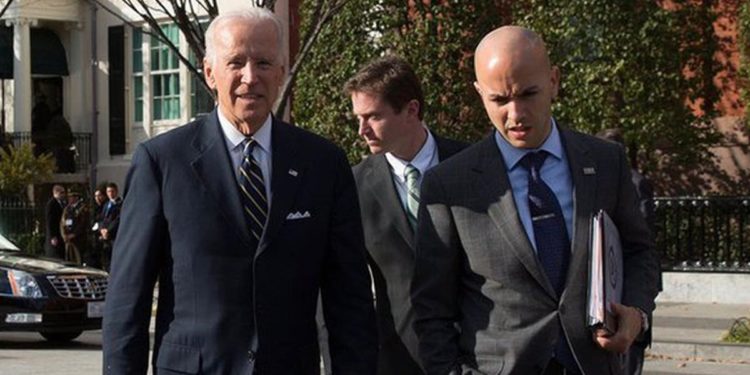
Juan González (right) with US President Joe Biden (left). Photo: David Lienemann

Orinoco Tribune – News and opinion pieces about Venezuela and beyond
From Venezuela and made by Venezuelan Chavistas

Juan González (right) with US President Joe Biden (left). Photo: David Lienemann
Caracas, February 26, 2022 (OrinocoTribune.com)—According to Juan González, an advisor to US president Joe Biden for Latin America and the director of the National Security Council for the Western Hemisphere, the recent battery of sanctions against the Russian Federation due to the conflict in Ukraine will also have an impact on governments having economic ties to Russia.
“The sanctions on Russia are so robust that they will have an impact on those governments with economic links to Russia,” stated González. “And that is by design, so Venezuela will start to feel that pressure; Nicaragua will start to feel that pressure, and Cuba as well,” he added in the typical US bully tone. However, he does not seem to have considered that many countries have already found alternatives to liberate themselves from the unprecedented level of sanctions and unilateral coercive measures that Washington maintains on more that 30 countries worldwide.
RELATED CONTENT: President Putin Didn’t Spark World War III, he Just Averted it!
In the weeks prior to Russia’s entering Ukrainian territory, when Russian and US officials made comments about possible Russian military installations in Cuba or Venezuela, mainstream media chatter was raised to a fevered pitch over Cuba, Nicaragua and Venezuela, creating the impression of a battlefield in an attempt to call up a scenario similar to the “Cuban Missile Crisis” of 1962. At that time, an imminent nuclear apocalypse was averted, as Washington was poised to launch a nuclear attack when it was revealed that Soviet ballistic missiles were being installed in Cuba.
Biden advisor: U.S. sanctions against Russia are 'designed' to impact Venezuela, Nicaragua and Cuba. pic.twitter.com/Zbqg3mgB2N
— Kawsachun News (@KawsachunNews) February 26, 2022
Joe Biden’s advisor, while discussing the implications of the new sanctions on Russia, added that Washington wants “negotiated solutions to the crisis in Venezuela, restoration of the democratic order in Nicaragua, and we want the Cubans to be the ones who determine their future, and not a dictatorship.” This was just another event in the repetative Washington script to demonize progressive countries in Latin America that do not bow to US dictates and follow an independent foreign policy.
RELATED CONTENT: Venezuela Gives Full Support to Putin & Criticizes US and NATO Militarism
Some analysts believe that González’s comments, made during an interview for Voice of America (VOA), apart from being typical bluff trying to magnify the significance of US sanctions, might be a signal of a possible Washington plan to bring the Ukrainian crisis to Latin America and exploit that in its favor in the region. If that is the plan, then it will be counter-productive to take such an approach, considering the current balance of power between leftist and right-wing governments in the region that is not favorable to Washington.
When asked by the VOA journalist how exactly the sanctions on Russia will impact the government of Venezuela, González, without much assertiveness, managed to say that the US sanctions that were applied against 13 of the most important financial institutions in Russia will affect any government or company that maintains trade with these organizations, and allegedly those governments that operate outside the US-controlled financial system will “feel the punch,” though he did not explain exactly how or why.
“Venezuela, and many other countries illegally sanctioned by the US regime, have shown that the power of US and European sanctions is not impossible to beat,” said Indian analyst Saheli Chowdhury when consulted by Orinoco Tribune. “Sanctions affect the lives of millions in any country under sanction, but sooner rather than later, those same sanctions force those countries to develop mechanisms to minimize the effects and allow them to move on. This new battery of sanctions against Russia, in spite of the evident devastating initial effect, will facilitate the creation of more robust mechanisms to fight illegal sanctions, like the ones impose constantly by Washington, Canada and the European Union, among others.”
Featured image: Juan González (right) with US President Joe Biden (left). Photo: David Lienemann
Special for Orinoco Tribune by Jesús Rodríguez Espinoza
OT/JRE/SC/EF

Jesús Rodríguez-Espinoza is an expert in international relations, Venezuelan politics, and communication. He served for several years as Consul General of Venezuela in Chicago (United States); before that, he was part of the foundational editorial team of Aporrea.org. He is the founder and editor of the Venezuelan anti-imperialist news outlet Orinoco Tribune.